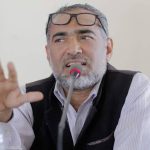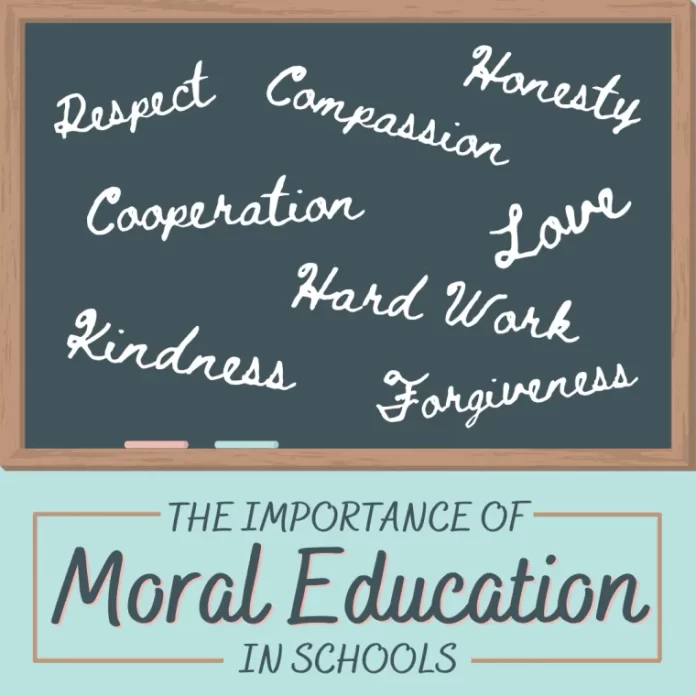 – Syed Tanveer Ahmed
– Syed Tanveer Ahmed
The Mudaliar Commission report is available on the website of the Markazi Taleemi Board (taleemiboard.org). People active in the field of education can read it. The eighth chapter of this detailed 321-page report is of great importance and pertains to the subject matter of this article. The title of the chapter is “The Education of Character.”
From pages 119 to 131, i.e. this 13-page section of the report discusses the importance and methodology of imparting moral education. Even in the new NEP 2020, there are no such details regarding moral education.
Here are the key points of this chapter from the Mudaliar Commission: The highest aim of education should be the formation of morally conscientious citizens. Education without moral science will turn man into a mere economic animal. While the responsibility of moral education lies with the family and society, it is also the responsibility of schools. Hence, for imparting moral education, cooperation between the school, family and society is necessary. It is the responsibility of teachers to organise moral training in schools. For this, teachers and students should not only have a professional relationship, but this relationship should rise beyond that and the teacher should become a mentor for the students. This is possible only when the teachers do not limit their responsibility to the extent of making the students perform in the exams, but also pay attention to the personality development of the students.
The process of moral education in schools is not effective until the adults in society become role models of what is being taught in the school. Under this point, the commission has specifically mentioned the behaviour, conduct and speeches of political leaders. This was pointed out in 1953, but it is even more relevant today than it was back then.
The New NEP talks about reducing hatred and eliminating prejudices, respecting each other’s religions and inculcating these qualities in students. The students too may be learning about these attributes from teachers in the classroom. However, what are students seeing and hearing today in the world outside of their schools? Anger, hate, frivolous talk, distorted history, extremism, and promotion of sectarianism on TV channels – this is what is being heard and seen through social media and mass media.
According to veteran journalist Ravish Kumar, students are being turned into live bombs and IEDs. The slightest spark can cause them to explode and wreak havoc. The Mudaliar Commission warned at the time (1952) against such scenario. Books should be written and read for nation-building and not confined to being tools and aids for exam preparation.
The Mudaliar Commission also mentioned utilising co-curricular activities for moral education. After highlighting the importance of moral education, the commission also made some suggestions for inculcating ethics and morals in the students.
Some of the important suggestions of the Mudaliar Commission are as follows:
Moral limits should be respected and observed in all school activities and morals should be inculcated in children through these activities. Students should be grouped and formed into teams. The practice of grouping students into different “houses” that exists in CBSE schools even today was included in the commission’s recommendations. The purpose of making “houses” and grouping students was to enable students of different languages, cultures and classes to come together and perform activities together. The clubbing of students into houses epitomises “unity in diversity”, which the commission says is essential for Indian society. Co-curricular activities should be organised in which sports, Scout and Guide, NCC and NSS are worth mentioning.
In the same chapter, there is also a section on “Religious and Moral Instruction”, under which religious education and its effects are discussed. While recognizing religious education, the commission has made it clear that since the Government of India functions on a secular basis, the education system designed by the government should neither endorse nor propagate any particular religion.
After clarifying the government’s position, the commission says that the school can provide religious education after school hours, but should not make it compulsory for all students to participate in those classes that are conducted after school hours. Mentioning another method, the commission has suggested that in religious education classes, which would be held after school hours, education of a particular religion could be arranged and for students who did not want to attend such classes, a moral science class should be arranged for them. This was an important proposal of the commission but now some state governments have stopped implementing it. This recommendation will be of great help when we try to offer suggestions and influence policies about education and educational institutions.
Religious books have been kept out of the official curriculum and schoolbooks since the British era. It has been argued that India is a secular country. The government is neither representative of any religion nor does it promote any specific religion. The secular nature of the state and education is a separate topic, but at the outset, we would like to highlight the fact that until now religious education was not included in our education system. However, in recent times there has been a deviation from this policy.
The National Institute of Open Schooling (NIOS) under the Ministry of Education is an important institution for popularizing education. A few subjects have been added recently for class 10 under this institution. Among those subjects is “Ved Adhyayan” (Vedic Studies). Now the question arises – are the Vedas religious scripture or aren’t they? If the Vedas are a religious text, then how can they (i.e. the learning of religious scripture) be incorporated into a secular education system?
If the Vedas can be included as a subject, then the Guru Granth Sahib, the Bible, the Bisvesvara “Vichana”, the Buddha’s “Sutras” or “Tipitaka”, the famous works of the famous Tamil philosopher Thiruvalluvar, subjects like Tirukkural and Quranic Studies could also have been included in the syllabus. (Note that Veda Adhyayan is included in the list of 25 subjects from which students of class 10 have to choose five subjects).
Some months back, Urdu newspapers published statements that Standard 10 students of the NIOS have to study Vedas as part of their curriculum. This is also not true. Veda Adhyayan (Vedic Studies) is an optional subject. Students can choose it if they want, or choose some other subject. However, we ask the question – why study only the Vedas? In a pluralistic society, students should be allowed to study the Vedas and others like Guru Granth Sahib, the Bible and the Qur’ān, etc. We have included this discussion in this article because the said commission has linked religious education with moral education.
When the Vedas can be given the status of a subject, the other religious and cultural books mentioned above should also be given the same status.
The Commission also asked that brief writings on religious leaders and personalities and interesting and instructive incidents from their biographies should be included in the textbooks. This work is being done by State Textbook Editing Committees and NCERT. However, the lessons that are included have little or no relevance to the various religious entities of the country.
In April 2021, a Standing Committee was formed to check the accuracy and proportionality of such content in history and sociology books. The committee had asked teachers, students and guardians of students for their objections and suggestions in this regard. It had given one month for this. We drew the attention of those engaged in the field of education in various states to respond to this requirement (i.e. to send suggestions and objections to the Standing Committee). We also requested them to send us their objections and suggestions. However, regrettably, we have received just one response only from the state of Jharkhand. This poor response could be attributed to the Covid-19 pandemic.
By the way, a “communal virus” has been influencing and affecting the activities of education policies and government policies in the country for many years, even before the onset of the Covid-19 pandemic. We all have to work together to discover and find a cure for this “communal virus”.




